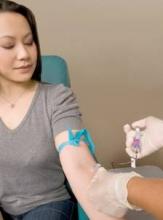All patients aged 15-65 years should be screened for HIV, regardless of their risk level, according to updated recommendations of the U.S. Preventive Services Task Force published online April 30 in the Annals of Internal Medicine.
The new strategy will substantially decrease the HIV disease burden across the country, dramatically reduce transmission of the virus, and markedly curtail infected patients’ progression to AIDS and death, said Dr. Virginia A. Moyer, chair of the USPSTF and professor of pediatrics at Baylor University and Texas Children’s Hospital, Houston, and her associates.
In its last set of HIV screening recommendations, issued in 2005, the USPSTF advised screening only at-risk patients. At that time, the task force cautioned that testing of the general population would cause undue psychological harm and that treatment before symptom onset would expose patients to serious adverse effects without exerting enough benefit to outweigh that disadvantage.
But 8 years later, new, convincing evidence shows "with high certainty" that identifying and treating HIV infection in asymptomatic people will substantially benefit public health as well as the health of those individual patients.
This change in screening recommendations is "of critical significance," because it brings the USPSTF into line with the Centers for Disease Control and Prevention on the issue of HIV screening, Dr. Moupali Das and Dr. Paul Volberding said in an editorial accompanying the new recommendations.
"Now, with an increasing consensus on population-wide screening, a growing belief in universal treatment, and the goal of near-universal access to medical care under the Affordable Care Act, we may ultimately awaken from the nightmare of the HIV/AIDS epidemic," Dr. Das and Dr. Volberding noted.
Three key research findings drove the task force to update HIV screening guidelines.
First, it is now known that 20% of people infected with HIV are not aware that they are infected. That means an estimated 236,400 people in the United States don’t know that they should take precautions against transmitting the virus and begin treatment to limit HIV-related illness and end-organ damage, Dr. Moyer and her colleagues said (Ann. Intern. Med. 2013 [doi:10.7326/0003-4819-159-1-201307020-00645]).
Second, it has been proved that initiation of antiretroviral therapy before carriers become symptomatic – when CD4 counts are between 0.200 and 0.500 x 109 cells/L – markedly reduces progression to AIDS and death.
"Hesitation in screening diminishes with the acceptance of HIV infection as a chronic disease that can be controlled by increasingly potent, convenient, and safe drugs," Dr. Das and Dr. Volberding said in their editorial (Ann. Intern. Med. 2013 [doi:10.7326/0003-4819-159-1-201307020-00643]).
And third, the overall harms of screening the general population and treating those who are found to be HIV-positive are now considered "small." Both conventional and rapid screening tests are highly accurate, with sensitivities and specificities topping 99.5% – so the potential harms of false-negative and false-positive results are minimal. And treatment is highly effective, with benefits clearly outweighing adverse effects, Dr. Moyer and her associates said.
Accordingly, the USPSTF now recommends HIV screening for adolescents as young as 15 years and adults as old as 65 years, regardless of their risk status. And HIV screening remains advisable for patients of any age who are at risk.
The USPSTF also renewed its recommendation that all pregnant women should be screened for HIV, because identification and treatment "dramatically reduces the rate of mother-to-child transmission." Women screened during a previous pregnancy should be rescreened with every subsequent pregnancy.
"Both of these major U.S. treatment guidelines [the USPSTF’s and the CDC’s] now agree that all infected persons should be offered antiretroviral therapy ... to enable a more complete immune reconstitution with the goal of achieving a near-normal lifespan," said Dr. Das of the University of San Francisco and Dr. Volberding of the University of California San Francisco AIDS Research Institute. "Making an early diagnosis by screening asymptomatic persons is thus a vitally important entry into life-extending management."
The evidence is insufficient to establish what the optimal interval should be between screenings. However, it is "reasonable" to rescreen at-risk people at 1-year intervals. This includes patients who engage in high-risk behaviors and those who live in or receive medical care in high-prevalence settings such as correctional facilities, homeless shelters, TB clinics, sexually transmitted infection clinics, and clinics that serve men who have sex with men.
In addition, "the USPSTF concurs with the CDC’s recommendation that HIV screening should be voluntary and done only with the patient’s knowledge and understanding." Both organizations recommend that patients be fully informed about HIV infection and the meaning of test results and that they be screened unless they specifically decline (opt out of) HIV testing.


